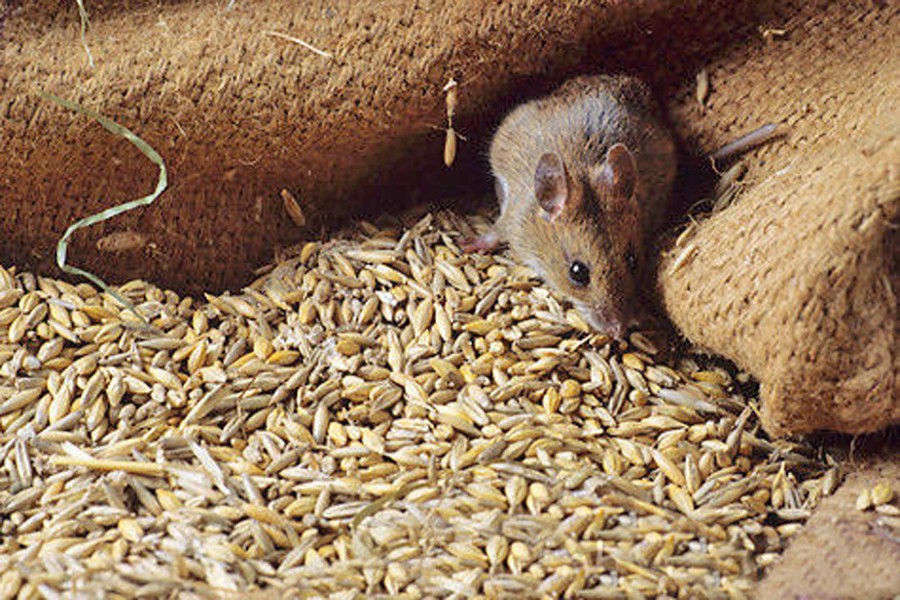RANGPUR, Oct 22: The peasants in eight districts under Rangpur division incur massive loss every year due to crop damage caused by rat attack during Aman season.
According to sources rats destroy around 0.2 million tonnes of Aman paddy in the division every year which severely affects its yield.
Sources said about 1.0 million to 1.2 million hectares of land are brought under Aman paddy cultivation in the division every year.
From these lands about 2.5 million tonnes to 2.8 million tonnes of paddy are produced. At least 5.0 to 7.0 per cent of the produced paddy is damaged by rats every year.
A mother rat has the capacity of giving birth 8 to 10 times a year and it also can conceive within 48 hours after giving birth to its children. A pair of rats can produce more than 3,000 offspring each year, sources also said.
The number of rats has increased numerically this year owing to scanty rainfall in the region. Thousands of rats have attacked the Aman fields in Rangpur, Kurigram, Gaibandha, Nilphamari, Lalmonirhat, Dinajpur, Thakurgaon and Panchagarh districts and have already swallowed a huge quantity of crops.
Rats are causing havoc to paddy fields despite several attempts made by the farmers to prevent the menace, sources alleged.
Expressing apprehension over the situation farmers urged the authority concerned to take necessary measures in this regard so that they can get rid of the adverse circumstances soon.
According to sources a huge quantity of Aman paddy could be saved by killing rats last year as DAE launched a rat killing drive. During the drive a large number of rats in the division were killed, sources informed.
DAE official sources said the department has taken adequate measures to combat the adverse situation this year as well. Rat killing drives have already been launched across the region, sources added.
BSS adds: In Rajshahi, experts suggested mobilisation of school children along with others to spearhead an anti-rat campaign saying the notorious pest alone eat up nearly 4.0 per cent of the country's annually produced food grains and vegetables.
"Rats appeared to be a threat to our food security system . . . we can ensure the food security spearheading a successful campaign," additional director of the Department Agriculture Extension (DAE) Mustafizur Rahman said this at an inaugural programme of an annual rat killing drive at the DAE's zonal office in Rajshahi.
Eco-friendly rat management can be the vital means of protecting many beneficial insects together with maintaining a sound environment.
Bio-pest management system should be promoted among the growers widely to protect the beneficial insects from degradation for the sake of maintaining a sound environment and that is important for a sound ecosystem.
Divisional commissioner of Rajshahi Nur-Ur-Rahman, who joined the function as the chief guest, suggested involvement of the country thousands of school children in the rat annihilation campaign.
He urged the field-level officials and staffs concerned to motivate all the members of Integrated Crop Management (ICM) and Integrated Pest Management (IPM) as well as school children and others concerned to take part in the drive so that it could be succeeded.
He said coordinated involvement of particular ethnic groups of people who consume rats as food could also be an effective was of making the drive a total success.
According to statistics the country's annual cereal food production last year was 37.266 million metric tons while the vigitable yield was 3.06 million tones while rats destroyed some 1.5 million tonnes of the total production.
Experts say a pair of rats can give birth to about 3,000 offspring yearly to cause havoc for the crop production and added annihilation of the harmful creature would affect little the ecological balance.
DAE's deputy director Joynal Abedeen presented the keynote paper at the function narrating various aspects of rat killing and urged all concerned to extend their cooperation in this regard.
He says all insects are not harmful for the crops but the chemical pesticides or insecticides are more or less dangerous for both human health and other beneficial insects.
He, however, says the destructive as well as the injurious insects can easily be controlled through promoting eco- friendly method of using organic fertilizer and indigenous insecticides instead of chemical ones.
Principal Scientific Officer of Fruit Research Station Alim Uddin and Deputy Director of Regional Horticulture Research Center Dr Saifur Rahman also spoke at the function.


